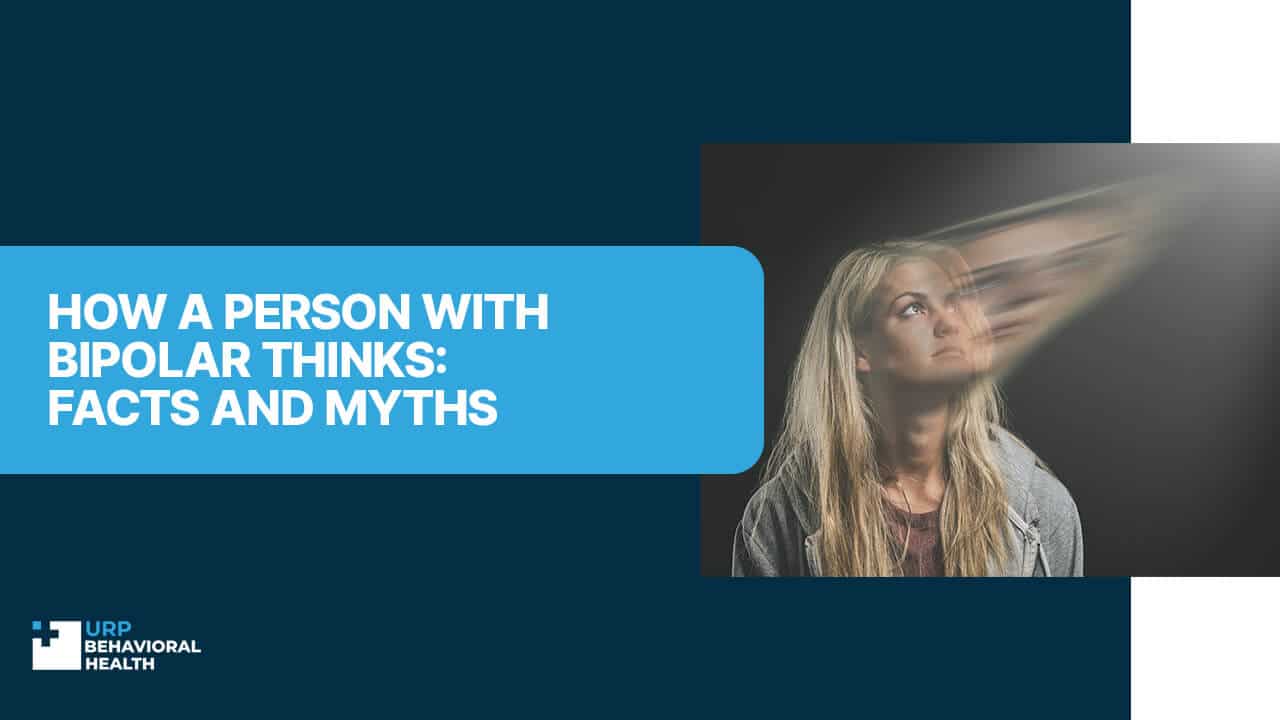
How a Person with Bipolar Thinks: Facts and Myths
Bipolar disorder is a condition of severe mental illness that manifests in a wide range of moods, from emotional highs (mania or hypomania) to lows (depression), demonstrating a complex pattern of change. Rejecting common myths and providing factual insights into bipolar thinking, this article offers practical guidance and support strategies to break the cycle of common misconceptions.
Does Bipolar Disorder Affect How a Person Thinks?
Depression and bipolar disorder can cause severe and permanent damage due to early symptoms and the resulting cognitive and social functioning. Besides altered energy and activity levels, the condition invariably triggers cognitive changes that are also affected by episodes of mood, from manic to depressive. During these occurrences, individuals may encounter altered cognitive functioning during these episodes, resulting in distorted perceptions and impaired judgment [1][2].
For example, during manic episodes, a person might think rapidly, jumping from one idea to another, often with grandiose or unrealistic plans. This phenomenon, known as “racing thoughts,” can make it difficult for individuals to focus or complete tasks [3]. In contrast, depressive episodes can bring about pervasive negative thoughts, feelings of worthlessness, and difficulty concentrating [4]. These fluctuations in thinking are not constant but are closely tied to the individual’s mood state, making bipolar thought patterns complex and variable.
Understanding these cognitive changes is essential for recognizing the challenges faced by those with bipolar disorder and providing appropriate support. This can help to understand the real factors behind bipolar states in a way that can be more helpful in managing underlying problems, whether it’s managing overloaded thoughts during a mania or battling negative thinking in the presence of bipolar. [5].
Don’t wait - confidential help is available right now for you or your loved one.
How Does Bipolar Disorder Affect a Person’s Thoughts?
Various phases of the mood cycle affect individuals with bipolar disorder, impacting the way they think. Manic phases may involve individuals experiencing increased creativity, goal-directed actions, and a sense of invincibility. Weak expectations and poor judgment can be created by overconfidently optimistic attitudes towards potential outcomes [1][2].
Conversely, when experiencing depressive states, mental activity can be remarkably negative, even if it persists. I believe that… Consistent feelings of guilt, hopelessness, and self-doubt can negatively impact individual decision-making and problem-solving skills, often resulting in marked consequences [4]. The disorder is often undetectable, resulting in sudden changes in the disorder’s behavior and can sometimes be responsible for abrupt phases of thought.
Understanding the changes in thinking patterns of individuals with bipolar disorder and their caregivers is essential for them to acknowledge. It may assist in devising strategies to effectively manage symptoms and improve mental health if possible.
How Does Bipolar Disorder Affect Memory?
Bipolar disorder patients frequently exhibit memory difficulties, which can lead to memory loss. Both manic and depressive episodes can also impair memory functions. The onset of manic phases can cause problems with attention and memory retention and concentration, particularly when dealing with rapid and disorganized thought processes that are frequently encountered during these stages [4]. Memory loss or inability to recall specific details or gaps in memory can be caused by this.
Memory retention and recall may be significantly impacted by the slow cognitive processing and pervasive negative thinking experienced during depressive stages. Some individuals may experience difficulty focusing, resulting in difficulties when trying to encode new memories. Mindset issues associated with memory problems can manifest not only during mood swings but also during states of cognition that are clinically responding, impacting cognitive functioning [1][5].
To develop coping mechanisms, it is important to comprehend how bipolar disorder affects memory and memory function. This may involve strategies to improve memory recall, including the use of mnemonic devices, maintaining a structured schedule, and seeking cognitive behavioral therapy (CBT) to address cognitive distortions and improve mental clarity [3, 4].
Reach out today and let us create a treatment plan designed around your needs.
Common Thought Patterns During a Manic Episode
An elevated mood, increased energy, and significantly altered thinking patterns are typical symptoms of manic episodes in bipolar disorder. One of the key mental signs of dementia is racing thoughts, which are a deceleration of the brain, marked by a rapid breakdown of ideas and frequent interchangeability between ideas. This may lead to a proliferation of ideas, many of which are either grandiose or unrealistic [1][3]. Individuals may believe they possess extraordinary talents or abilities, leading to overconfidence and risky behavior.
Mania can also be accompanied by distraction, which is the occurrence of the individual being easily distracted from a single task for a prolonged duration. Daily activities and productivity can be disrupted by the constant reversal of attention, leading to problems and attention being interrupted. Impulsiveness is characterized by the tendency to act quickly and decisively, without considering the potential benefits of delayed decisions. Impulsive thinking can lead to financial issues, unstable relationships, and other serious consequences if it is erroneously processed. [2][5].
People may become more talkative than usual during the heightened mood, resulting in frequently heavy-spoken speech that requires frequent and atypical pressured speech. Communication is challenging for them due to their jumbled thoughts or seeming lost to others. Caregivers and mental health professionals who need to provide support and intervention during manic episodes should consider these thought patterns to help guide their diagnosis and treatment approach.
Common Thought Patterns During a Depressive Episode
Depressive episodes in bipolar disorder are characterized by a widespread feeling of sadness, hopelessness, and a significant decrease in cognitive abilities, which can result in paralyzed states. Individuals may also engage in negative thinking, where they may dwell on past mistakes, feel inferior, and believe that their circumstances will never be better [1][4]. This negative outlook can be so severe that it leads to suicidal ideation in some cases.
Those with cognitive sluggishness experience cognitive sluggishness, which is a common occurrence among individuals, often exhibiting difficulty when focusing, deciding, or performing simple tasks. This mental predicament can cause forgetfulness and a feeling of being prevented from doing anything right by simply putting it off. Cognitive difficulties may be compounded by a deficiency in energy and motivation, which can make it challenging for individuals to engage in or enjoy activities they previously enjoyed [2][3].
Ruminative ideas are often incorporated into depression-related thinking during depressive episodes. The cycle of negative thinking in which people experience negative events at least once a week can be triggered by replaying the negative events in their mind. The possibility of this rumination further aggravates the depressive state, making it difficult to recover from. Cognitive behavioral therapy can improve mental resilience by helping individuals to reframe negative thoughts, much like cognitive behavioral therapy [5].
Myths About How Bipolar Person Thinks
- Constant Mood Changes: Those who suffer from bipolar disorder are commonly believed to experience a never-ending upsizing of emotions, contrary to popular belief. Although mood swings are frequent, they are always episodic and can last for days, weeks, or months. [1].
- Unpredictable Behavior: Despite the occasional chance of fluctuating mood episodes, individuals with bipolar disorder can lead stable lives with appropriate treatment and guidance. To improve mood and behavior, management strategies can be employed to effectively manage mood and behavior and manage behavioral responses. [3].
- Split Personality: Many people with bipolar disorder are misguided and mistaken for having a polyphane or multiple personalities. Extreme mood swings are typical symptoms of this mood disorder, not dissociative identity disorder. [2].
- Lack of Control: Bipolar individuals may be unable to control their actions, contrary to popular belief. Treatment can help people manage their symptoms effectively and lead productive lives. [4].
Conclusion
Understanding the distinct mental processes that lead to bipolar disorder and the various treatment strategies is critical, as treating the disorder is just as important as understanding the individual’s own thinking. When recognizing the importance of examining evidence-based evidence and avoiding common myths, we may also have a greater understanding of how we view people with bipolar disorder in a positive light and positively impact their mental health. If you or someone you know is experiencing bipolar thoughts and has symptoms, seek professional help to manage the condition with ease.
We’ll help you understand your options and guide you toward care.
Sources
- National Institute of Mental Health (NIMH). (2024). “Bipolar Disorder.” https://www.nimh.nih.gov/health/topics/bipolar-disorder
- Mayo Clinic Staff. (2023). “Bipolar Disorder: Symptoms and Causes.” https://www.mayoclinic.org/diseases-conditions/bipolar-disorder/symptoms-causes/syc-20355955
- Cerullo, M. A., & Strakowski, S. M. (2013). “Affective disorders and cognition.” https://www.psychiatric.theclinics.com/article/S0193-953X(12)00117-7/abstract
- Harvard Health Publishing. (2023). “Bipolar Disorder.” https://www.health.harvard.edu/mental-health/bipolar-disorder
- Miklowitz, D. J. (2002). “The Bipolar Disorder Survival Guide: What You and Your Family Need to Know.”
















